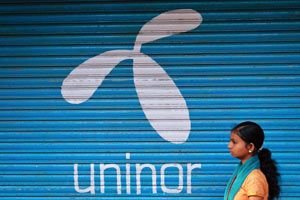 Restaurants and washrooms may have provided the ambience for some brilliant ideas, but for telecom operator Uninor, the flicker of inspiration came when a top executive was on his way home in an autorickshaw. Uninor Maharashtra circle head Ritesh Singh’s idea of branded auto-rickshaws, milkmen and newspaper vendors selling SIM cards and rechargevouchers at customers’ doorsteps was immediately lapped up by the company, which is the Indian arm of Norwegian telecom operator Telenor.To boost sales, VideoconBSE -1.95 % Mobile Services, another operator, is sendingretailers and distributors on holiday to exotic locations and giving away LED TVs before they even begin selling SIM cards or recharge vouchers.Uninor and Videocon, which won back licences in spectrum auctions last year, are feeling the need to adapt and innovate in the overcrowded domestic telecom market, which, according to research firm Gartner, will touch Rs 1.2 lakh crore in revenue terms in 2013. These companies, along with Sistema Shyam’s MTS, have restarted operations after the Supreme Court last year canceled the mobile permits of several telecom operators in the 2G spectrum allocation case. MTS secured licences last month.
Restaurants and washrooms may have provided the ambience for some brilliant ideas, but for telecom operator Uninor, the flicker of inspiration came when a top executive was on his way home in an autorickshaw. Uninor Maharashtra circle head Ritesh Singh’s idea of branded auto-rickshaws, milkmen and newspaper vendors selling SIM cards and rechargevouchers at customers’ doorsteps was immediately lapped up by the company, which is the Indian arm of Norwegian telecom operator Telenor.To boost sales, VideoconBSE -1.95 % Mobile Services, another operator, is sendingretailers and distributors on holiday to exotic locations and giving away LED TVs before they even begin selling SIM cards or recharge vouchers.Uninor and Videocon, which won back licences in spectrum auctions last year, are feeling the need to adapt and innovate in the overcrowded domestic telecom market, which, according to research firm Gartner, will touch Rs 1.2 lakh crore in revenue terms in 2013. These companies, along with Sistema Shyam’s MTS, have restarted operations after the Supreme Court last year canceled the mobile permits of several telecom operators in the 2G spectrum allocation case. MTS secured licences last month.
With a modest investment, Uninor has trained 30 auto-drivers to comply with regulations for enrolling new customers and retaining existing ones. The sales drive has been panned out to include milkmen and newspaper vendors in Hadapsar and Vishrantwadi localities in Pune. As part of the strategy, these new sales agents source the SIM cards and recharge vouchers from a local distributor who also processes and verifies new customer forms.
This go-to-customer strategy, an industry first, will be replicated across the state and eventually in all the six circles where Uninor operates – UP East, UP West, Bihar and Jharkhand, Andhra Pradesh, Gujarat, Maharashtra and Goa.
“The response has been phenomenal. By being near the customers, our mobile retailers are two to three times efficient compared with regular retail channels, which translates to more business,” said Uninor’s chief marketing officer, Rajeev Sethi. Uninor’s strategy is also helping boost incomes for these new agents. According to Sethi, the monthly income of the auto driver, for instance, goes up by Rs 2,500 with about 50-60 transactions a month. The driver ends up getting the same commission per transaction as a shop retailer selling Uninor’s products, he added.
The telecom company now plans to launch 1,000 auto recharge vehicles in five or six cities across Maharashtra over the next six months.
Videocon Mobile Services, on the other hand, is handing over the proverbial carrot instead of just dangling it – in Punjab, Gujarat, Madhya Pradesh and Haryana, the circles where the operator has permits, retailers and distributors will be awarded upfront with LED televisions and trips to exotic locales . The company has set aside 10 crore for this.
There is a catch, though: the partner must commit to sell a certain number of SIM cards and recharges in these markets. “These are the people that we will deal with for the next 20 years, we have to establish trust,” said Arvind Bali, chief executive of Videocon Mobile Services. The mobile services division of the $20-billion Videocon Group is also tying up with local FMCG companies to expand its customer base.
Videocon and Uninor’s strategies are a sharp contrast to those of incumbent operators who have cut dealer commissions and reduced spends on acquiring new customers.Bharti AirtelBSE 4.55 %, Idea CellularBSE 5.20 %, Vodafone, Tata TeleservicesBSE 2.60 %and Aircel have withdrawn freebies and slashed talk-time on pre-paid discount vouchers in order to increase sales and margins.